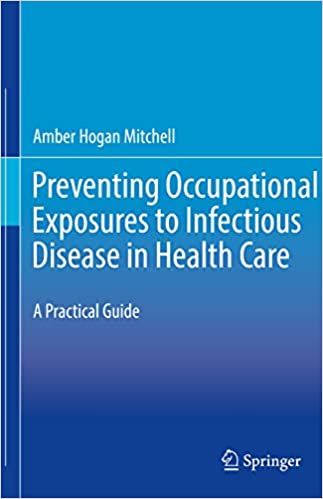This book is a practical guide for preventing occupational exposures to bloodborne and infectious disease in health care. It is a timely and essential resource given that people working in healthcare settings sustain a higher incidence of occupational illness than any other industry sector, and at the time of publication of this book we are in the midst of a global pandemic of COVID-19. While the guide is focused on health care primarily, it would be useful for preventing exposures to essential workers in many other industries as well.
The guide offers easy-to-follow instruction, all in one place, for creating, implementing, and evaluating occupational health and safety programs. Readers have practical information that they can use now to either build a new program or expand an existing one that protects workers from occupationally associated illness and infection. With a focus on the public health significance of building better, safer programs in health care, the book provides not just the evidence-based or data-driven reasoning behind building successful programs, but also includes sample programs, plans, checklists, campaigns, and record-keeping and surveillance tools. Topics explored among the chapters include:
• Occupational Safety and Health Administration (OSHA) Regulatory Compliance • Other Regulatory Requirements, National Standards, and Accreditation • Performing a Hazard Assessment and Building an Exposure Control Plan • Engineering Controls and Safer Medical Devices • Personal Protective Equipment Placement and Use • Facing a Modern Pandemic
Preventing Occupational Exposures to Infectious Disease in Health Care is a comprehensive resource for both seasoned and novice professionals with primary, secondary, or ancillary responsibility for occupational or employee health and safety, infection prevention, risk management, or environmental health and safety in a variety of healthcare or patient care settings. It also would appeal to those working in public health, nursing, medical, or clinical technical trades with an interest in infection prevention and control and/or occupational health and infectious disease.
The guide offers easy-to-follow instruction, all in one place, for creating, implementing, and evaluating occupational health and safety programs. Readers have practical information that they can use now to either build a new program or expand an existing one that protects workers from occupationally associated illness and infection. With a focus on the public health significance of building better, safer programs in health care, the book provides not just the evidence-based or data-driven reasoning behind building successful programs, but also includes sample programs, plans, checklists, campaigns, and record-keeping and surveillance tools. Topics explored among the chapters include:
• Occupational Safety and Health Administration (OSHA) Regulatory Compliance • Other Regulatory Requirements, National Standards, and Accreditation • Performing a Hazard Assessment and Building an Exposure Control Plan • Engineering Controls and Safer Medical Devices • Personal Protective Equipment Placement and Use • Facing a Modern Pandemic
Preventing Occupational Exposures to Infectious Disease in Health Care is a comprehensive resource for both seasoned and novice professionals with primary, secondary, or ancillary responsibility for occupational or employee health and safety, infection prevention, risk management, or environmental health and safety in a variety of healthcare or patient care settings. It also would appeal to those working in public health, nursing, medical, or clinical technical trades with an interest in infection prevention and control and/or occupational health and infectious disease.











